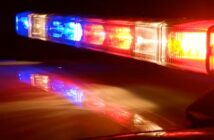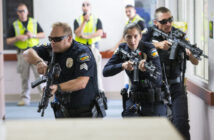We all know that fireworks pose a safety hazard during the July 4 weekend, but did you know Aunt Edna’s potato salad might also present a health risk?
While burns, fires and unintended explosions due to fireworks grab headlines every year, it turns out that some of the biggest safety hazards of Independence Day are the same things that we need to watch out for all summer long. Follow these eight tips and have a safe and happy Fourth!
1. Stay safe in the water. Drowning ranks fifth among the leading causes of unintentional injury death in the United States, thanks in part to people’s overconfidence in their swimming ability. Never swim alone, and make sure that kids’ water play is supervised at all times – really supervised. Many drownings and near-drownings occur when adults are nearby, so whoever is on lifeguard duty should stay alert and vigilant at all times. Statistics show that most young children who drown in pools have been out of sight for less than five minutes.
2. If you’re going to drink, drink responsibly. Hopefully by now you know not to drink and drive. You should also avoid drinking and swimming and drinking and boating. And it should go without saying that drinking and setting off fireworks definitely don’t mix. Alcohol impedes judgment and motor skills, so if you’re imbibing, designate someone else to handle the BBQ, lifeguard duty and sparklers.
3. Be a Grill Master. Completely thaw meat and poultry before grilling so it cooks more evenly, but don’t thaw on your kitchen counter or outside. Use the refrigerator for slow, safe thawing or thaw sealed packages in cold water. For quicker thawing, you can microwave defrost if the food will be placed immediately on the grill. If you’re marinating your meat, a good rule of thumb: Poultry and cubed meat or stew meat can be marinated up to 2 days in the refrigerator, while beef, veal, pork, and lamb roasts, chops, and steaks may be marinated up to 5 days. If you want to use the marinade as sauce for the cooked meat, set some aside before placing raw meat into. Otherwise, bring the marinade to a complete boil first to destroy harmful bacteria.
4. Keep your food out of the sun. Lying out in the sun is not good for our skin it’s really not good for our food. To avoid foodborne illness, the FDA recommends against leaving food out for more than one hour when the temperature is above 90-degrees and not more than two hours at other times. Foods that need to be kept cold should be placed in a cooler and held at a maximum temperature of 40-degrees. While mayonnaise and other egg dishes are often associated with food poisoning, any food can potentially become contaminated. Adequate hand washing and food preparation can also help prevent food poisoning.
5. Wear sunscreen and hit the shade. Ultraviolet rays from the sun contribute to skin cancer risk, so the American Academy of Dermatology recommends using a daily sunscreen with a minimum SPF of 15. Sunscreen needs to be reapplied regularly during the day to maximize its usefulness, particularly after swimming. To help save your skin – and reduce your risk of heat stroke and other heat illnesses, duck indoors or under a tree for periodic breaks from the hot sun.
6. Drink plenty of fluids. Strenuous activity or sports played in the hot sun increase your risk of heat illness, a problem that is particularly troublesome for people with chronic medical conditions and the elderly. Drink plenty of water to avoid dehydration and decrease risk of heat illness.
7. Obey firework laws. Fireworks are not legal in the city of Anaheim. Even if you buy legal fireworks in one of the six cities in Orange County that permits the sale of fireworks, you may not bring them into Anaheim, or store them or set them off in city limits.
8. Follow firework safety instructions. If you elect to set off fireworks in a city that permits it, make sure the fireworks you buy carry the official state Fire Marshall label and follow the manufacturer’s instructions carefully. Fireworks should always be used in safe, open areas away from buildings, dry vegetation, and especially people and animals. A connected garden hose should be ready nearby and a pail of water kept handy for disposal of spent fireworks and “duds,” faulty, unexploded fireworks.
Happy Fourth of July!
 Behind the Badge
Behind the Badge


